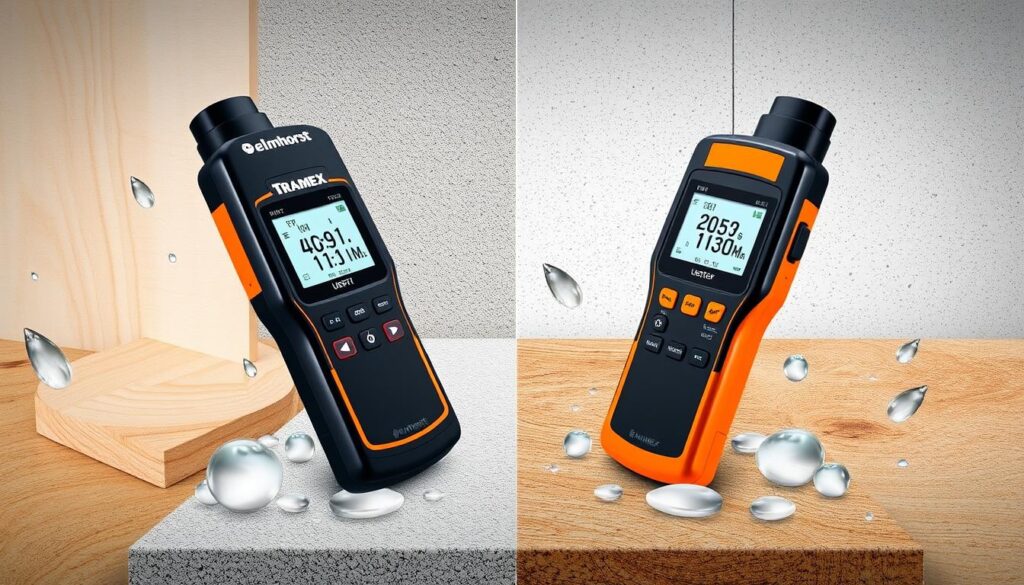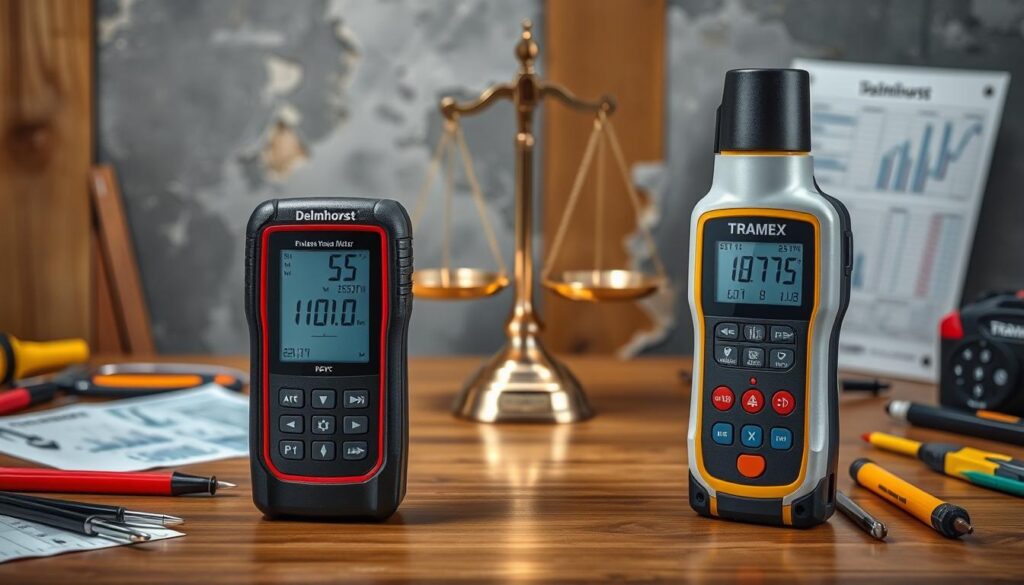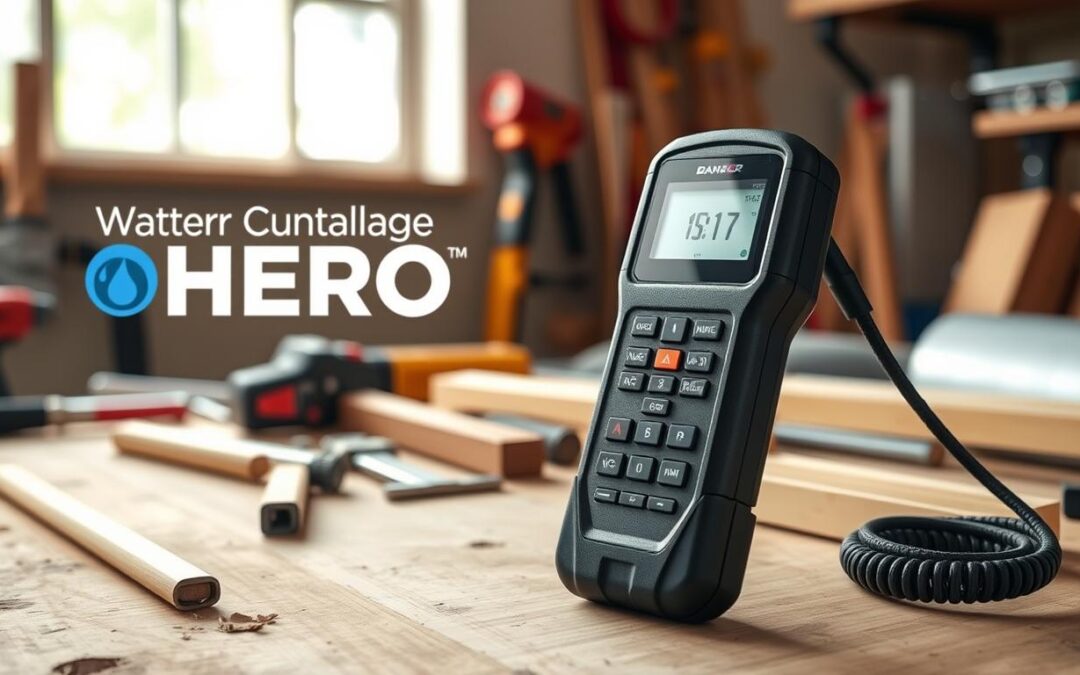In the construction world, Delmhorst and Tramex are top names for moisture detection. They are favorites among home inspectors, contractors, and building experts. But, which one is the best? The answer might just surprise you.
Pinless moisture meters are gaining popularity for their non-invasive way of checking moisture. They don’t need to poke holes like old-style meters. Both Delmhorst and Tramex lead the pack with their top-notch tools. But, which one fits your needs best?
Key Takeaways
- Delmhorst and Tramex are two of the most trusted brands in the moisture meter industry.
- Pinless moisture meters offer a non-invasive approach to measuring moisture levels, making them a popular choice for professionals.
- Selecting the right moisture meter for your specific application requires a deep understanding of the features and capabilities of each brand.
- Factors like accuracy, depth of detection, and material compatibility are crucial when choosing the best moisture meter for the job.
- Investing in a high-quality moisture meter can save time, money, and prevent costly damage in construction and building inspections.
Understanding Moisture Meters in Building Inspection
Moisture meters are key for building inspectors. They help find water problems and damage in buildings. There are two main types: pin and pinless meters. Both are important for professional standards and getting accurate moisture readings.
Types of Moisture Detection Technology
Pin-type moisture meters have sharp probes that go into the surface. They measure the material’s electrical resistance or conductance. This gives direct moisture content readings.
Pinless or search mode meters, on the other hand, use electrical current or radio waves. They detect moisture without touching the surface. This lets inspectors check through surfaces like tile or roofing.
The Importance of Accurate Moisture Readings
Getting moisture measurements right is key. It helps find problems and see if a place is safe to live in, after floods. Mold starts to grow when surfaces have about 20% moisture.
Moisture meters are vital for those fixing damage. It’s important to calibrate and understand the readings. This ensures results are reliable for different materials and situations.
Professional Standards and Requirements
Building inspection standards require using moisture meters. They check moisture in materials like wood, drywall, and stucco. Inspectors need to know how to spot false readings and understand what pinless meters can do.
They also need to know how to interpret readings in water damage cases. Getting certified and keeping up with training is often needed to stay good at using these tools.
| Moisture Meter Type | Measurement Capabilities | Typical Applications |
|---|---|---|
| Pin-type | Direct reading of moisture content by penetrating the surface | Testing the surface moisture of materials like stucco, drywall, and wood |
| Pinless/Search Mode | Non-invasive detection of moisture through surfaces like tile and roofing | Inspecting for water intrusion and potential damage in buildings |
“Moisture meters are considered essential tools for restorers in 2021 due to the high risk of mold growth in materials exposed to excess moisture.”
Key Features of Professional Moisture Meters
Professional moisture meters have special features that set them apart. They are designed for building inspectors and contractors. These tools help detect moisture accurately and reliably.
They can do both pin-type and pinless moisture measurements. Pin-type meters insert sharp electrodes into materials. Pinless meters scan the surface without damage. This lets professionals check moisture in many materials safely.
Accuracy is key for these meters. The Amprobe MT-10 measures moisture in wood and building materials with great precision. It can detect moisture from 8% to 60% in wood and 0.3% to 2% in building materials. The Delmhorst BD-2100 can measure gypsum moisture from 0.2% to 50%.
| Moisture Meter Model | Moisture Measurement Range |
|---|---|
| Amprobe MT-10 | Wood/Paper: 8 ~ 60%, Building Material: 0.3 – 2.0% |
| Delmhorst BD-2100 | Gypsum scale: 0.2 – 50% moisture range |
| Extech MO257 | Moisture content range: 0-100%, Measurement Depth: 0.78 In. (20mm) to 1.6 In. (40mm) |
| GE Protimeter BLD2000 Mini | Moisture range: 6-90% |
| Sonin 50211 Rapitest | Moisture range: 10% to 28% |
Calibration and adjustment are important for these meters. The Tramex Moisture Encounter PLUS lets you adjust for different materials. This ensures accurate readings.
Features like Bluetooth connectivity and temperature compensation make these meters even better. They offer a full solution for moisture management in buildings.
Knowing the features of professional moisture meters helps professionals choose the right tool. This ensures accurate moisture detection and effective management.
Delmhorst vs Tramex Pinless/Invasive Moisture Meters
Delmhorst and Tramex are top brands in professional moisture meters. They offer high-quality tools with unique features. Let’s compare their prices, technical specs, and accuracy.
Price Comparison and Value Analysis
Moisture meters from Delmhorst and Tramex cost between $250 and $400. Some models can go up to $500. For example, the Delmhorst FX-20/1235/18 kit costs $379. The Delmhorst BDX30 P01 package is around $300.
The Tramex Protimeter Hygromaster 2 and Digital Mini Kit is about $400. Both brands offer great value with their features and accessories. Users love their accuracy, durability, and ease of use.
Technical Specifications Overview
Delmhorst and Tramex moisture meters have impressive specs. They offer both pinless and invasive options. This lets users pick the best method for their needs.
The Wagner Orion 950 by Delmhorst has an EMC calculator. The Tramex Encounter series is versatile, measuring moisture in many materials.
Accuracy and Calibration Features
Accuracy is key for professional moisture meters. Delmhorst and Tramex focus on this. Their meters give reliable readings, with many having calibration features.
Users often say Delmhorst and Tramex meters are accurate. They stay calibrated and give consistent results, even in tough conditions. This is crucial for building inspections and construction.
Tramex Moisture Encounter Series Deep Dive
The Tramex Moisture Encounter series, including the ME5 model, is a favorite among building inspectors and restoration experts. It’s known for its reliability, accuracy, and long life. This makes it a top choice for finding moisture without damaging materials.
This series stands out because it can find moisture in many materials like tile, roofing, and concrete. The tramex moisture encounter meters have been a key tool in the industry for over 20 years. Some users have used them for more than 21 years, showing their durability and lasting performance.
| Model | Price | Features |
|---|---|---|
| Tramex ME5 | $580.00 | Non-destructive moisture detection, readings through various materials, long-lasting battery life |
| Extech MO55 | $118.51 | Combination pin and pinless moisture meter, affordable price point, accurate readings |
| FLIR MR40 | $69.99 | 2-pin moisture meter with built-in flashlight, versatile and budget-friendly |
Even though the Tramex Moisture Encounter series is pricier than some pinless moisture meter options, many see it as a good investment. Its reliable performance and long-lasting nature, along with accurate readings, make it a top pick for professionals. They need tools that are precise and dependable.
“I’ve been using the Tramex moisture meter for over 21 years, and it’s still going strong. The reliability and accuracy of this tool have been invaluable in my line of work.”
Tramex also offers other high-quality moisture meters, like the MRHIII. It’s often used in legal and expert witness scenarios because of its high precision and credibility. For those looking for a reliable and long-lasting tramex moisture encounter solution, the Tramex Moisture Encounter series is a strong contender in the market.
Delmhorst BD2100 and Tech-Check Plus Analysis
The Delmhorst BD2100 and Tech-Check Plus meters are top picks for moisture detection. They meet the needs of building inspectors, contractors, and restoration pros. Each meter has unique features for different tasks.
Pin vs Pinless Functionality
The Delmhorst BD2100 uses pins to measure moisture in wood, drywall, and concrete. Its probes go into the surface for exact readings. This gives detailed moisture profiles.
The Delmhorst Tech-Check Plus does it all with pins and pinless tech. It uses RF to check moisture without touching the surface. This is great for delicate or finished areas.
Specialized Applications and Uses
The BD2100 shines in high-ceiling checks with a remote probe. This makes reaching high spots easy and fast. It’s perfect for quick moisture checks.
Both meters are known for their accuracy and dependability. They’re key for wood, drywall, and concrete checks. Their special settings help make precise measurements. This aids in making smart decisions and following industry rules.
| Feature | Delmhorst BD2100 | Delmhorst Tech-Check Plus |
|---|---|---|
| Moisture Detection Technology | Pin-based | Pin and Pinless |
| Specialized Applications | High-ceiling inspections with remote probe | Finished surfaces and delicate materials |
| Accuracy and Reliability | Highly accurate and reliable | Highly accurate and reliable |
In summary, the Delmhorst BD2100 and Tech-Check Plus meet various needs. They offer great performance, flexibility, and precision. These tools are crucial for accurate moisture detection and analysis.
Performance in Different Materials and Conditions
Professional moisture meters are made to give accurate readings in many building materials. This includes wood, concrete, drywall, and masonry. Pinless meters, like the Tramex Moisture Encounter, are great for non-destructive tests on surfaces like tile and roofing. They give valuable insights without damaging anything.
Some meters, like the Flir MR60, have special modes for different materials. This lets users adjust their measurements for the job’s needs. When picking a moisture meter for building material detection, think about the materials you’ll test. This ensures the best performance and results.
| Moisture Meter Model | Depth of Measurement | Accuracy | Versatility |
|---|---|---|---|
| General Tools Digital Pinless Moisture Meter | Up to 3/4-inch | N/A | Wide range of materials |
| Wagner Meters Orion 910 Pinless Wood Moisture Meter | 0.25 to 0.75 inches | N/A | Specialized for wood |
| Dr. Meter Pinless Wood Moisture Meter | N/A | 0.5% of moisture levels | Specialized for wood |
| General Tools 4-in-1 Combo Moisture Meter | N/A | N/A | Pin and pinless capabilities |
When checking wood, concrete, or other materials, picking the right moisture meter is key. Knowing how different models perform helps you choose the best one. This ensures your moisture meter performance meets your project’s needs.

Professional Applications and Industry Standards
Moisture meters are key in professional inspections and legal cases. Certified Master Inspectors (CMIs) use top-notch moisture meters like the Delmhorst BD2100 or Tramex Moisture Encounter series. They need proper training and certification to ensure accurate moisture testing.
Legal and Expert Witness Considerations
As an expert witness, knowing the equipment well is crucial. Moisture meter readings can be key evidence in court. Inspectors must explain their testing methods and data clearly. Following industry standards makes their testimony stronger.
Certification and Training Requirements
- Certified Master Inspectors (CMIs) get special training on moisture meters for building checks.
- Groups like the American Society of Home Inspectors (ASHI) and the International Association of Certified Home Inspectors (InterNACHI) offer certification. They focus on moisture meter use.
- Staying updated and calibrated is key to keeping skills sharp and readings accurate.
Choosing high-quality moisture meters and getting certified shows a commitment to being a pro. Following industry standards and protocols helps inspectors provide reliable findings. These findings support their clients in legal battles.
Cost-Benefit Analysis for Professional Inspectors
Professional inspectors often wonder if they should spend on a moisture meter cost-benefit or choose a cheaper option. The answer depends on the long-term value and benefits these professional inspector tools bring.
High-quality moisture meters from brands like Delmhorst or Tramex cost between $250 and $1,600 or more. This might seem expensive at first. But, the advantages they offer are often worth the cost.
- Accuracy and Reliability: Top-notch moisture meters ensure accurate and consistent readings. This helps inspectors make solid decisions and give reliable data to clients.
- Legal Defensibility: A high-quality moisture meter is key in legal cases or expert witness testimony. It helps defend the inspector’s findings.
- Versatility and Longevity: Durable, feature-rich moisture meters work well with many materials. They offer long-term value for inspectors.
The moisture meter cost-benefit analysis for inspectors should consider the initial cost against long-term benefits. The peace of mind and chance for expert witness work justify the higher price.
“Investing in a quality moisture meter is not just about the upfront cost, but the long-term benefits it can provide in terms of accuracy, legal defensibility, and versatility. It’s a valuable tool that can set professional inspectors apart in the industry.”

Maintenance, Calibration, and Longevity
Keeping moisture meters reliable and accurate is key for building inspectors and contractors. Delmhorst and Tramex offer great warranty and support services. They help professionals keep their equipment in top shape.
It’s vital to check moisture meters regularly for accurate readings. The Delmhorst BD 2100 and F2000 have built-in features for quick calibration. Tramex meters also need calibration checks and geo-tagging for surveys and inspections.
Looking after your moisture meter can make it last longer. Many Tramex meters have lasted over 20 years with proper care. The Accelerated Moisture Resistance test checks these meters’ durability and reliability.
| Calibration Feature | Delmhorst | Tramex |
|---|---|---|
| Built-in Calibration Checks | Yes (BD 2100, F2000) | No |
| Calibration Certificate | Yes | Yes |
| Geo-tagging of Readings | No | Yes |
| Typical Lifespan | 15-20 years | 20+ years |
Good moisture meter maintenance, regular calibration requirements, and long-term meter longevity are crucial. They ensure accurate and reliable readings in important situations.
“Calibration ensures precise readings crucial for construction, agriculture, and quality control applications.”
Investment Considerations for New Inspectors
As a new building inspector, getting the right moisture meter is key. You might find cheaper options like the Extech MO55 or Flir MR40. But, meters from Delmhorst and Tramex are usually more accurate and last longer.
The moisture meter for new inspectors that stands out is the General Tools MMH800 4-In-1 Combo Moisture Meter. It’s seen as the best overall choice. The FLIR MR277 Thermal Imaging Moisture Meter is also great for all-in-one inspections. Plus, Tramex meters and kits are known for their non-destructive testing and precise measurements.
For beginner inspector tools, the Delmhorst ProScan pinless meter is a top pick. It’s easy to use and gives reliable moisture readings. The Tramex Moisture Encounter MEX5 is another good choice for building inspections. It’s a dual-depth, non-invasive meter.
Buying a top-notch moisture meter might cost a lot. But, it’s a vital tool for any building inspector. By picking the right meter, you’ll do better inspections. This means better results for your clients and your business.
Conclusion
Delmhorst and Tramex are top choices for the best pinless moisture meter. They offer reliable and high-quality options for building inspectors. The decision often depends on personal preference, specific needs, and budget.
Choosing a good moisture meter is key for accurate inspections and expert witness roles. You should think about pin vs pinless, material, and reliability. Both Delmhorst and Tramex have a strong track record, giving precise and consistent readings.
Choosing either Delmhorst or Tramex means you’re getting a reliable tool for your work. By looking at each brand’s details, you can pick the best pinless moisture meter for your needs.
FAQ
What are the main differences between Delmhorst and Tramex moisture meters?
What are the advantages of pinless and pin-based moisture detection?
How important is calibration and maintenance for professional moisture meters?
What features should I look for in a professional-grade moisture meter?
How do Delmhorst and Tramex meters perform in legal and expert witness situations?
What should new inspectors consider when investing in a moisture meter?
Source Links
- Moisture Meter
- custom best moisture meter for general contractor|consumer reports moisture meters : wholesaling
- 10 Best Moisture Meters In 2019 [Buying Guide] – Instash
- Moisture Meters for Inspectors
- Innovations in Moisture Meters
- Guide to Choosing a Moisture Meter
- The Best Moisture Meters, Tested and Reviewed
- Are All Moisture Meters Equal – Top Wood Moisture Meters
- Catalog – Moisture Meters – By type: Pin-type meters – Page 3
- Moisture meter
- Moisture meters for a newb?
- Best moisture meter
- Weather Stations, Measuring & Layout Tools, DIY Tools & Workshop Equipment, Home, Furniture & DIY
- custom gypsum moisture meter|Delmhorst G : trader
- custom gypsum moisture meter|delmhorst gypsum wall board humidity : mail order
- Wood Moisture Meter
- Professional Wood Moisture Meters | High-Quality Moisture Meters (2020)
- Catalog – Moisture Meters – By type: Non-destructive meters – Page 3
- Moisture meter -Stucco
- Our Tools | Profound Home Inspections in Wichita, KS – Profound Home Inspections – Serving Wichita & Surrounding Areas
- Pinless Moisture Meter Market Research Report 2032
- Opportunities and Challenges in the Pinless Moisture Meter Market: Strategic Insights and Forecast (2024-2031)
- custom digital moisture meter calibration|reading chart for moisture meter : agencies
- custom digital moisture meter calibration|moisture meter calibration certificate : solutions
- Building Moisture Analyzer Market Research: Size, AI, and Automation Trends Explained
- custom building inspection moisture meter|using moisture meter on drywall : discounter
- custom moisture meter building inspection|acceptable moisture readings in drywall : trader
- custom meter to detect moisture in walls|moisture meter for walls screwfix : trading
